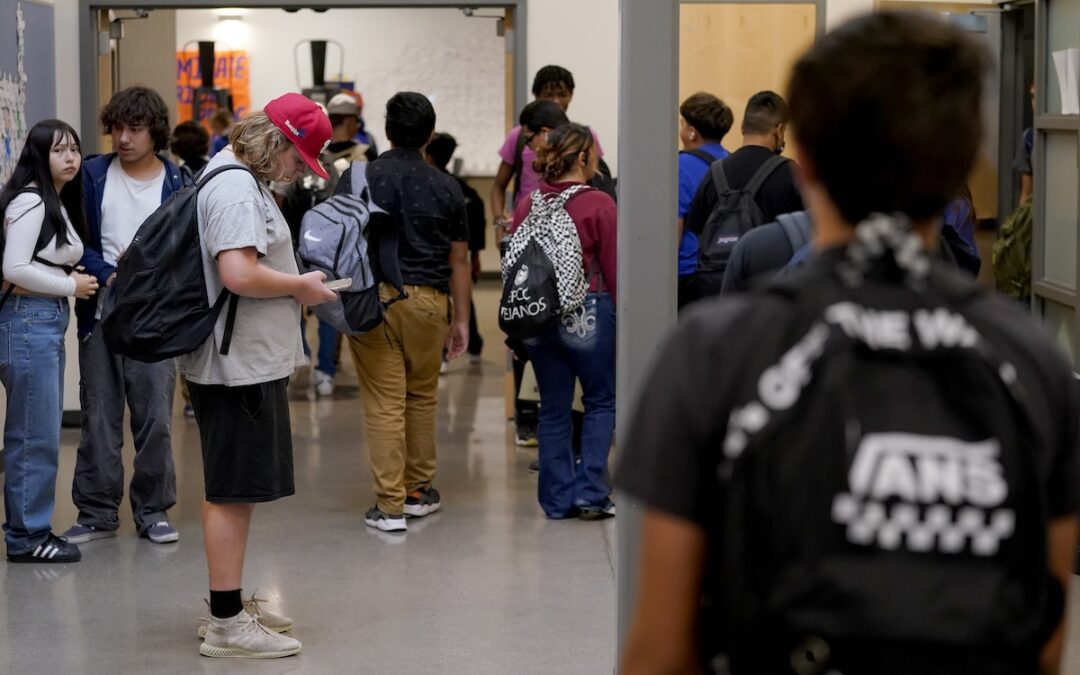
President Donald Trump signs an executive order to reduce the size and scope of the Education Department alongside school children signing their own versions, during a ceremony in the East Room of the White House on March 20, 2025 in Washington, DC. The order instructs Education Secretary Linda McMahon, former head of the Small Business Administration and co-founder of the World Wrestling Entertainment, to shrink the $100 billion department, which cannot be dissolved without Congressional approval. (Photo by Chip Somodevilla/Getty Images)
WASHINGTON – Parents of students with disabilities along with their teachers and advocates were left wondering what comes next after President Donald Trump directed Secretary of Education Linda McMahon to dismantle her department on Thursday.
Arizona schools received about $227 million in federal funds last year for special education, according to state data. The grants are distributed by the federal Department of Education under the Individuals with Disability Education Act, or IDEA.
It’s unclear if the funding would still come from that department as it’s dismantled, and especially if it’s fully eliminated. Trump said core functions — including special education programs — would be “preserved in full” but “redistributed to various other agencies and departments.”
RELATED: Disability assistance on the chopping block as costs for Arizona’s school voucher system continue to soar
Education leaders and other critics expect cuts, though. And families that rely on services the funds provide are seeking reassurance.
“They’re all worried,” said Paul McDonald, a former school superintendent in Arizona who works as a consultant for parents of children with disabilities. “What’s going on at the federal level to this all, it’s causing a lot of anxiety.”
Nationwide, 7.5 million students receive special education and related services under the federal Individuals with Disabilities Education Act (IDEA), according to the National Center for Education Statistics. That’s about 15% of the public school population.
Arizona had 141,000 students with disabilities in the 2022-2023 school year, according to the state Department of Education.
Most students with an Individual Education Plan, or IEP, have a learning disability, autism, a speech or language impairment or some other health impairment. Services and accommodations can include occupational, physical or speech therapy; extended time to complete assignments; written backup to oral instructions; shorter assignments; audiobooks and assistive devices.
McDonald said state law should ensure that students don’t lose services. But he is concerned that local schools aren’t equipped to deal with some of the funding decisions that could eventually fall to them.
RELATED: Vouchers & poor funding are forcing these Arizona public schools to close
“All we’re doing is pushing the burden for these services to the state and these taxpayers … aren’t we then having to do it state by state?” he said.
A Phoenix-area advocate, Shannon Wilke, is telling parents to get any pending paperwork done sooner rather than later and “get as much in writing as you possibly can,” in case of procedural changes or slowdowns at the federal level.
“Everyone’s kind of up in arms about what could happen,” she said, adding that the system is already strained. “Any reduction in federal education funds, and schools are going to struggle even more to provide the mandated services.”
Arizona Superintendent of Public Instruction Tom Horne welcomed Trump’s move, saying he hopes the funding Congress provides for education will be controlled at the state level, and not by “bureaucrats in Washington.”
“We can do a much better job than they can do. They’re mostly an irritant in our communications,” Horne said Thursday in an interview with Cronkite News.
White House press secretary Karoline Leavitt said Thursday that “critical functions” of the federal Education Department would not be cut.
Advocacy groups and parents remain worried.
Among other impacts, Trump’s actions will be “taking away special education services for students with disabilities,” National Education Association President Becky Pringle said Wednesday ahead of the announcement.
Amanda Glass, managing attorney of the education team at Disability Rights Arizona, expects growing obstacles when a student is being bullied or faces discrimination, and “if a kiddo is not getting a service they need.”
One avenue is for parents to file a civil rights complaint.
“Much of that is enforced by the U.S. Department of Education,” Glass said. And while understaffing has meant slow response, she added, Trump’s moves to eliminate that office and its specialists mean parents have nowhere to turn but the courts.
“Filing a lawsuit, even going to an administrative hearing, is not easy. It’s not something that every family can afford” or figure out how to pursue, she said. “Having these government entities providing the oversight, providing some low cost enforcement, has been huge. And proposing to get rid of the Department of Ed in many ways will decimate that.”
For more stories from Cronkite News, visit cronkitenews.azpbs.org.

Arizona has a teacher shortage. The state’s top education officials say this fueled it
A survey from the Arizona Department of Education shows over 4,200 teacher positions are filled by long-term substitutes, student teachers,...

The shutdown is hurting schools whose budgets are mostly federal money
In Chinle, Arizona, financial distress caused by the government shutdown has led to the suspension of after-school programs, including some that...

‘This feels like fascism’: Arizona teachers push back on Trump’s ‘Patriotic Education’ agenda
Arizona teachers warn a federal plan to promote “patriotic education” could reshape how American history is taught — and who gets to define it,...

Trump asks U of A to commit to his agenda and get favorable access to federal money
WASHINGTON (AP) — The White House is asking nine major universities to commit to President Donald Trump’s political priorities in exchange for more...





